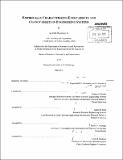Empirically characterizing evolvability and changeability in engineering systems
Author(s)
Beesemyer, Jay Clark, Jr
DownloadFull printable version (40.98Mb)
Other Contributors
Massachusetts Institute of Technology. Dept. of Aeronautics and Astronautics.
Advisor
Donna H. Rhodes and Adam M. Ross.
Terms of use
Metadata
Show full item recordAbstract
The beginning phases of system development and conceptual design require careful consideration, as these decisions will have significant influence on system lifetime performance and are often made with incomplete system knowledge. Decision makers may improve their capacity to discriminate between system concepts and design choices by measuring a system's "ilities" such as changeability, evolvability, and survivability. These ilities may enable systems to respond to perturbations in the design space, context space, and needs space in order to ensure system functionality and adequate performance over time. A system may be designed to change in response to perturbations, or remain statically robust/survivable to perturbations in order to avoid deficiencies or failures. This research attempts to analyze the mechanisms that allow system changes to occur. More specifically, this research will further the characterization of system changeability and evolvability and ultimately provide a structured and meaningful way of classifying system characteristics often described as "ilities". Value sustainment is proposed as an ultimate goal of systems, providing value in spite of perturbations in design, context, or needs. The premise of value sustainment is investigated through four distinct research thrusts: 1) a basis for defining system changes and ilities; 2) a system change examples database with categorical cluster analysis case research; 3) epoch-shift, impact, response, outcome case research; and 4) expert interviews case research. Focusing on change-related ilities, this research proposes constructs for identifying and enabling vague, yet desirable, system properties. Evolvability is characterized as a subset of changeability and defined as the ability of an architecture to be inherited and changed across generations [over time], with a set of ten proposed design principles including decentralization, redundancy, targeted modularity, scalability, integrability, reconfigurability, mimicry, leverage ancestry, disruptive architectural overhaul, and resourceful exaptation.
Description
Thesis (S.M.)--Massachusetts Institute of Technology, Dept. of Aeronautics and Astronautics, 2012. "June 2012." Cataloged from PDF version of thesis. Includes bibliographical references (p. 205-212).
Date issued
2012Department
Massachusetts Institute of Technology. Department of Aeronautics and AstronauticsPublisher
Massachusetts Institute of Technology
Keywords
Aeronautics and Astronautics.